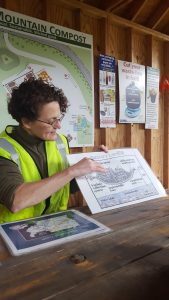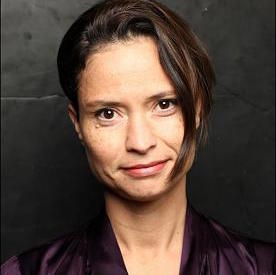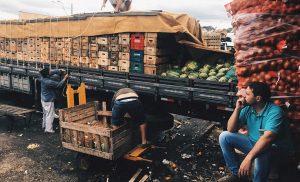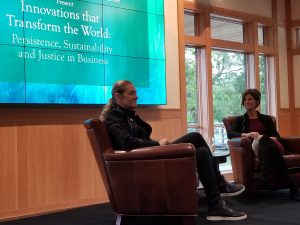A student team in The Sustainable Innovation MBA Class of 2018 conducted this speculative case analysis in their “Sustainable Brand Marketing” course for the ill-fated Cape Wind offshore wind farm in Cape Cod, Mass. The team consisted of Julia Barnes, Taylor Mikell, Julia Lyon, and Randy Baron. This article was primarily written and adapted for the Review by Ms. Barnes.
The case study is a lesson in what can happen when one loses control of the narrative surrounding a controversial project and fails to invest strategically in stewarding innovation through the gauntlet of implementation. This is what can happen when strategic messaging is undervalued – the first offshore wind farm in America stalled in 2015 and is considered dead.
Jim Gordon, a Boston entrepreneur who made his fortune in energy, conceived of the Cape Wind offshore wind farm as the next step in his mission to provide efficient and environmentally sound energy. After all, wind power had already proved successful in Europe and the technology was becoming more sophisticated every year. The cost of successful wind power generation in countries like Denmark and Germany was even as low as $.04 per KW hour. Gordon had also identified an attractive location – Horseshoe Shoal, off the coast of Hyannis Port, Mass. where a 130-turbine farm could theoretically make an extremely significant dent in the use of fossil fuel for residents of Cape Cod. With depth and wave conditions that made construction of these huge turbines feasible, Gordon was looking at an investment of over a billion dollars to see his dream of offshore wind energy come to life.
 However, he faced a number of issues in executing the Cape Wind vision. First, Gordon immediately ran into extreme and well-funded opposition from rich property owners along the coast who did not want to see their ocean view marred by wind turbines. People from the Koch Brothers to Bunny Mellon to Walter Cronkite joined forces behind the Alliance to Protect Nantucket Sound (APNS): a NIMBY (not-in-my-backyard) group flush with cash and influence who set out to discredit Gordon and undercut the validity of the Cape Wind project. Second, Cape Wind faced prominent political opposition. The influence and connections of the APNS board members wreaked havoc for Cape Wind’s political standing and extensive lobbying efforts damaged the progress of what would have otherwise been a highly embraced endeavor. Finally, Cape Wind was an expensive undertaking – one whose fluctuations in cost had significant impact on its timeline.
However, he faced a number of issues in executing the Cape Wind vision. First, Gordon immediately ran into extreme and well-funded opposition from rich property owners along the coast who did not want to see their ocean view marred by wind turbines. People from the Koch Brothers to Bunny Mellon to Walter Cronkite joined forces behind the Alliance to Protect Nantucket Sound (APNS): a NIMBY (not-in-my-backyard) group flush with cash and influence who set out to discredit Gordon and undercut the validity of the Cape Wind project. Second, Cape Wind faced prominent political opposition. The influence and connections of the APNS board members wreaked havoc for Cape Wind’s political standing and extensive lobbying efforts damaged the progress of what would have otherwise been a highly embraced endeavor. Finally, Cape Wind was an expensive undertaking – one whose fluctuations in cost had significant impact on its timeline.
Problem Analysis: Well-funded NIMBYism – The coast of Massachusetts along Nantucket Sound is home to many extremely wealthy and influential residents. Exhibit 8 shows the span of wealth that runs from Oyster Harbor to the Kennedy Compound in Hyannis. These multi million-dollar views would be impacted by the construction of Cape Wind. The obstruction was enough to have them form APNS and arm it with millions of dollars in funds, high-powered lobbying efforts, and a massive public relations campaign to discredit and destroy Cape Wind. As APNS alleged, Cape Wind would negatively impact commercial and recreational boating, impair fishing, harm tourism, kill bird populations and upset the Cape’s tax base with property value decline. While citing factually based evidence to the contrary, Gordon also answered these claims with impact studies and the support of Clean Power Now, a pro-wind, grassroots community group with pennies compared to APNS. APNS was skilled in enlisting Chambers of Commerce, town government, fishermen, lobstermen and boaters to their cause – a middle-class demographic that had little in common with the rich individuals behind the AstroTurf movement.
Continue reading “The Cape Wind Project: The Importance of Strategic Messaging”
 The Net Impact Graduate Chapter at the University of Vermont is designed to supplement learning experiences for students in the Sustainable Innovation MBA program. For our first event of the year a number of chapter members took a field trip to the Green Mountain Compost Facility in Williston, Vt..
The Net Impact Graduate Chapter at the University of Vermont is designed to supplement learning experiences for students in the Sustainable Innovation MBA program. For our first event of the year a number of chapter members took a field trip to the Green Mountain Compost Facility in Williston, Vt..

 This article was written by
This article was written by 
 During a break from undergraduate studies, Rothblatt was inspired by traveling and working with a NASA satellite station. She wondered if it would be possible to have something in the Earth’s orbit that could give music to the world. Feeling enthused, she returned to school to study communication. She continued onto grad school and graduated from UCLA with JD-MBA degree. All the while, Rothblatt’s passion for satellite communication continued to remain at the forefront of her life, leading her to become founder and CEO of
During a break from undergraduate studies, Rothblatt was inspired by traveling and working with a NASA satellite station. She wondered if it would be possible to have something in the Earth’s orbit that could give music to the world. Feeling enthused, she returned to school to study communication. She continued onto grad school and graduated from UCLA with JD-MBA degree. All the while, Rothblatt’s passion for satellite communication continued to remain at the forefront of her life, leading her to become founder and CEO of  However, he faced a number of issues in executing the Cape Wind vision. First, Gordon immediately ran into extreme and well-funded opposition from rich property owners along the coast who did not want to see their ocean view marred by wind turbines. People from the Koch Brothers to Bunny Mellon to Walter Cronkite joined forces behind the Alliance to Protect Nantucket Sound (APNS): a NIMBY (not-in-my-backyard) group flush with cash and influence who set out to discredit Gordon and undercut the validity of the Cape Wind project. Second, Cape Wind faced prominent political opposition. The influence and connections of the APNS board members wreaked havoc for Cape Wind’s political standing and extensive lobbying efforts damaged the progress of what would have otherwise been a highly embraced endeavor. Finally, Cape Wind was an expensive undertaking – one whose fluctuations in cost had significant impact on its timeline.
However, he faced a number of issues in executing the Cape Wind vision. First, Gordon immediately ran into extreme and well-funded opposition from rich property owners along the coast who did not want to see their ocean view marred by wind turbines. People from the Koch Brothers to Bunny Mellon to Walter Cronkite joined forces behind the Alliance to Protect Nantucket Sound (APNS): a NIMBY (not-in-my-backyard) group flush with cash and influence who set out to discredit Gordon and undercut the validity of the Cape Wind project. Second, Cape Wind faced prominent political opposition. The influence and connections of the APNS board members wreaked havoc for Cape Wind’s political standing and extensive lobbying efforts damaged the progress of what would have otherwise been a highly embraced endeavor. Finally, Cape Wind was an expensive undertaking – one whose fluctuations in cost had significant impact on its timeline. The unique bike shop is a not-for-profit organization that, in addition to selling and servicing new and used bicycles, helps get bikes into the hands of low income Vermonters who need them for mobility, health and freedom. In addition to providing bikes, the Old Spokes Home offers job training, classes, social programs and guided rides.
The unique bike shop is a not-for-profit organization that, in addition to selling and servicing new and used bicycles, helps get bikes into the hands of low income Vermonters who need them for mobility, health and freedom. In addition to providing bikes, the Old Spokes Home offers job training, classes, social programs and guided rides. 
 I was MBA-bound for a while. I took the GMAT once and was exploring future options for MBA programs. I did lots of research on two-year programs, which I liked. I was going to push the application process out a year to continue studying for the GMAT, but instead I applied to The Sustainable Innovation MBA. I liked that the opportunity cost of attending The Sustainable Innovation MBA program was only one year and offered me a great change of network, too, away from my primary one in D.C.
I was MBA-bound for a while. I took the GMAT once and was exploring future options for MBA programs. I did lots of research on two-year programs, which I liked. I was going to push the application process out a year to continue studying for the GMAT, but instead I applied to The Sustainable Innovation MBA. I liked that the opportunity cost of attending The Sustainable Innovation MBA program was only one year and offered me a great change of network, too, away from my primary one in D.C.
 The Summit was sponsored by the
The Summit was sponsored by the  Before joining the PYXERA team, Asiala had been the Director of Corporate Citizenship at Dow Corning Company. Over three decades in the corporate sector taught her that environmental and social sustainability are not hindrances to business; rather, they can ensure long-term success and profitability. She carries that vision forward in her current role at PYXERA, where she works to leverage the strengths of corporations, governments, social sector organizations, educational institutions, and individuals to solve complex problems in inclusive and sustainable ways.
Before joining the PYXERA team, Asiala had been the Director of Corporate Citizenship at Dow Corning Company. Over three decades in the corporate sector taught her that environmental and social sustainability are not hindrances to business; rather, they can ensure long-term success and profitability. She carries that vision forward in her current role at PYXERA, where she works to leverage the strengths of corporations, governments, social sector organizations, educational institutions, and individuals to solve complex problems in inclusive and sustainable ways.